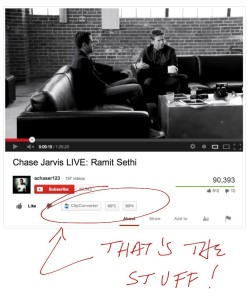Ninety percent of my car rides I spend listening to “self-development,” a convenient grouping for the countless interviews, TED talks, and commencement speeches on my iPod. These last three months, as I steadily increased the number of times I bicycled to work in lieu of trapping myself in a steel cage with wheels, I’ve missed out on hours of their words of encouragement.
In their place, I’ve traded for the sounds of morning sprinklers on pathetic strips of grass adjacent to sidewalks and apartment complexes, the rumble of earth movers beneath the stretch of the 10 across from Palms Blvd, and the whine of car horns as drivers blow reds and cut lanes sans signal. These are the sounds of the Los Angeles morning, the harmony to the melodious bike chain whirling beneath my seat and clacking against the gears. The sounds aren’t particularly educational or inspiring, but carry their own brand of tranquility, stillness in the chaos.
Seth Godin recently published a blog post entitled Can an audio book change your life? that inspired me to once again wire in. In the post he said:
“One of the key factors in both surviving this time and figuring out how to shift gears was my exposure to (as we called them then) books on tape, particularly the work of Zig Ziglar. I listened for sometimes hours every day. I’ve been grateful to Zig every day since, and I still listen regularly.
Wiring (Back) In
I started plugging in earphones for my bike commutes, tuning out the morning sounds as people I admire drop some knowledge while I pedal to work. (The first two pieces I listened to was the Charlie Hoehn interview on Blogcast FM and Tim Ferriss’s interview of Neil Strauss for CreativeLive, two interviews that have been on my queue for a while.)
Nothing’s changed me more than this unparalleled access to greater minds by simply plugging in earphones and touching play. Self-development audio books, interviews, and speeches have gotten me through more than commutes. I remember the summer before moving to Los Angeles, I listened to interviews every morning as I cleaned chairs and swept floors, prepping the restaurant before the first customers strolled in for an early lunch. Those interviews inspired me to continue injecting heart into my work, especially when it was difficult, and I was made better for that. For people who don’t listen to self-development for whatever reason (as Seth puts it, “People who haven’t tried it don’t want to. It feels a bit off-putting or mesmeresque to intentionally brainwash yourself with content designed to change your outlook”) the way I see it, there are only three alternatives for your commute (except of course, for silence):
You listen to the news. The news gives you a macro lens on current events upon which you can take no action, other than use in topical conversations with strangers who have nothing else to say to each other.
You can listen to music. While relaxing or enjoyable, in the long run, doesn’t provide much value (other than knowing the current pop sensation).
You listen to self-development. Which if you do over and over again, will create and alter life-long habits, by surrounding yourself with smarter people who’ve done greater things.
The latter, who is by far the most beneficial, has also never been much simpler as long as you have the right tool: Clip Converter.

A Shortlist To Get Started
After that, it’s a matter of curating what you’d like to listen to. I started a short list below. (I wanted to wait until I curated a monster list, separated by categories, but realized something was better than nothing, and a shortlist was more accessible than a monster one I envisioned):
- Ramit Sethi Interviews Derek Sivers – my notes
- Chase Jarvis Interviews Tim Ferriss
- Bryan Elliott Interviews Seth Godin
- Seth Godin’s Medicine Ball Sessions
- JK Rowling 2008 Harvard Commencement Speech
Another thought on the benefits of audio: I recently completed a Career Mastery pilot program created by Scott H. Young and Cal Newport. It was a four-week email course, where they explained the principles in writing and you completed “homework” that was emailed back to them. At the end of the pilot program, Scott and Cal conducted a “graduation webinar.” I struggled with the material for four weeks, and it wasn’t until the webinar that the concepts and theory really struck home. Hearing multiple examples of ideas in practice untangled the concepts for me, and for the first time since I joined the course, I had a clear idea of what I could accomplish with the strategies and how to go about it.
Choosing Who Surrounds You
There was a time when we couldn’t chose who surrounded us, or what ideas we immersed ourselves in, other than through books. But even that was limited, by access to the right books. Essentially we were locked to our context and our environment. Today we can pretty much immerse ourselves in anyone’s thoughts, and open ourselves up to whole new planes of thinking, without so much as leaving our computers. With unlimited access, it’s never been so easy to change our lives, and any excuse not to, falls on ears filled with the voices of people who already have.
Photos Credit: Jacob Bøtter
